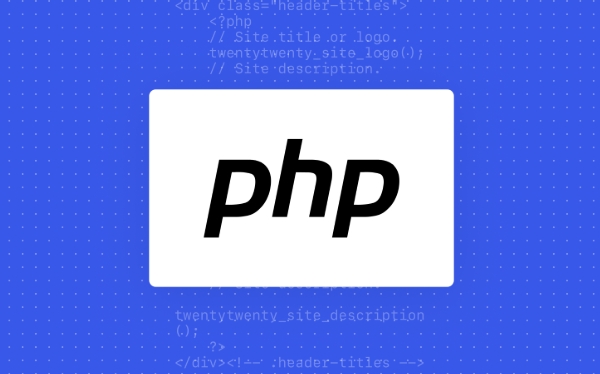 Backend Development
Backend Development
 PHP Tutorial
PHP Tutorial
 The Interpreter's Dilemma: Understanding How PHP Parses Escape Sequences
The Interpreter's Dilemma: Understanding How PHP Parses Escape Sequences
The Interpreter's Dilemma: Understanding How PHP Parses Escape Sequences
Jul 28, 2025 am 04:17 AMDouble-quoted strings interpret escape sequences like \n and \t during parsing, so literal backslashes require doubling (\\). 2. Single-quoted strings treat most characters literally, except \\ and \', making them safer for backslash-heavy content. 3. Escape sequences are resolved only in string literals at compile time, not in runtime strings from variables or input. 4. Heredoc behaves like double quotes (interpreting escapes and variables), while nowdoc behaves like single quotes (literal). 5. Use single quotes for paths and regex, escape backslashes in double quotes, and use stripcslashes() to process escapes in runtime strings. Understanding PHP's parsing phases and string types prevents confusion and ensures predictable output.

When working with strings in PHP, especially those involving backslashes and special characters, developers often run into confusing behavior. This isn’t a bug — it’s a consequence of how PHP parses escape sequences at different stages, depending on the context. This subtle but critical behavior is what we might call The Interpreter's Dilemma: understanding when and how PHP interprets escape sequences like \n, \t, or \\.

The key lies in recognizing that not all strings are processed the same way, and the type of string (single-quoted vs. double-quoted) and the parsing phase (lexing vs. runtime) dramatically affect the outcome.
1. Double-Quoted Strings: Escape Sequences Are Interpreted
In double-quoted strings, PHP interprets common escape sequences during parsing:

echo "Hello\nWorld";
Output:
Hello World
Here, \n is converted to a newline character because double quotes allow escape sequence interpretation. Other sequences like \t (tab), \$ (dollar sign), and \\" (quote) are also processed.

But here's where confusion starts: what if you want a literal \n?
echo "Path: C:\new_folder";
You might expect: C:\new_folder
But you get:
C: ew_folder
Why? Because \n is interpreted as a newline. To fix it, you must escape the backslash:
echo "Path: C:\\new_folder"; // Output: C:\new_folder
So in double-quoted strings, you need to double backslashes to get a literal one.
2. Single-Quoted Strings: Most Escapes Are Literal
Single-quoted strings are more predictable — almost everything is literal, except for two cases: \\ and \'.
echo 'Hello\nWorld'; // Output: Hello\nWorld echo 'C:\new_folder'; // Output: C:\new_folder echo 'It\'s a string'; // Output: It's a string echo 'Backslash: \\'; // Output: Backslash: \
This makes single quotes safer when dealing with file paths or regular expressions where backslashes are common.
? Rule of thumb: Use single quotes when you don’t need variable interpolation and want to avoid escape sequence surprises.
3. The Hidden Layer: Lexing vs. Runtime Parsing
Here’s where the interpreter’s dilemma deepens. PHP processes escape sequences not just when the script runs, but during the initial lexing phase — when the PHP engine first reads your source code.
Consider this:
$hex = "\x41"; echo $hex; // Outputs: A
The \x41 is parsed as hex 41, which is 'A' in ASCII. But what if the string comes from an external source?
$input = "\\x41"; echo $input; // Outputs: \x41
No interpretation happens here because this is just a string containing two characters: backslash and 'x'. The interpreter doesn’t re-parse escape sequences from runtime strings.
So the key insight is:
- Escape sequences are resolved only in string literals in your code.
- They are not resolved when the same characters appear in variables or input.
This is why functions like stripcslashes() exist — to manually process escape sequences from strings that were read or received at runtime.
4. Heredoc and Nowdoc: Behave Like Double and Single Quotes
Heredoc (with double quotes) interprets escape sequences and variables:
$name = "Alice"; echo <<<EOT Hello $name\n Welcome to PHP. EOT;
Output:
Hello Alice Welcome to PHP.
Nowdoc (with single quotes) treats everything literally:
echo <<<'EOT' Hello $name\n Welcome to PHP. EOT;
Output:
Hello $name\n Welcome to PHP.
So heredoc/nowdoc follow the same parsing rules as their quote counterparts.
Practical Tips to Avoid Pitfalls
To avoid confusion with escape sequences in PHP:
- Use single quotes for strings with many backslashes (e.g., Windows paths, regex patterns).
- In double quotes, always escape backslashes:
\\→\. - Remember that escape parsing happens only at compile time, not on runtime strings.
- Use
addcslashes()andstripcslashes()when you need to encode or decode C-style escape sequences manually. - Be cautious with JSON or config files — PHP won’t interpret
\nin a string read from a file unless you explicitly process it.
Understanding how PHP handles escape sequences isn’t about memorizing rules — it’s about recognizing the context: what kind of string am I in, and when is PHP parsing it?
Once you see that the interpreter makes its decisions early and only once, the “dilemma” starts to make sense.
Basically, it’s not magic — just parsing. But you’ve got to know when it happens.
The above is the detailed content of The Interpreter's Dilemma: Understanding How PHP Parses Escape Sequences. For more information, please follow other related articles on the PHP Chinese website!

Hot AI Tools

Undress AI Tool
Undress images for free

Undresser.AI Undress
AI-powered app for creating realistic nude photos

AI Clothes Remover
Online AI tool for removing clothes from photos.

Clothoff.io
AI clothes remover

Video Face Swap
Swap faces in any video effortlessly with our completely free AI face swap tool!

Hot Article

Hot Tools

Notepad++7.3.1
Easy-to-use and free code editor

SublimeText3 Chinese version
Chinese version, very easy to use

Zend Studio 13.0.1
Powerful PHP integrated development environment

Dreamweaver CS6
Visual web development tools

SublimeText3 Mac version
God-level code editing software (SublimeText3)

Hot Topics
 Navigating Backslash Hell: A Deep Dive into `preg_quote()` and Regex Escaping
Jul 26, 2025 am 09:51 AM
Navigating Backslash Hell: A Deep Dive into `preg_quote()` and Regex Escaping
Jul 26, 2025 am 09:51 AM
preg_quote()escapesregex-specialcharacters,includingbackslashesandthedelimiter,totreatthemasliterals;2.avoiddouble-escapingbypassingrawstrings(e.g.,'C:\path')withoutpre-escapedbackslashes;3.useforwardslashesinpathswhenpossibletoreducebackslashclutter
 Escape Character Behavior in PHP's Heredoc and Nowdoc Syntaxes
Jul 26, 2025 am 09:45 AM
Escape Character Behavior in PHP's Heredoc and Nowdoc Syntaxes
Jul 26, 2025 am 09:45 AM
Heredoc handles variable interpolation and basic escape sequences such as \n, \t, \\, \$, but does not process \" or \', while Nowdoc does not perform variable interpolation and any escape processing. All contents, including \n and variables are output literally; 1. Variables such as $name will be replaced, \\n will be parsed as newlines; 2. $name and \n are kept as is true in Nowdoc; 3. No escape quotes are required for both; 4. The end identifier must occupy one line and no leading spaces. PHP7.3 allows the use of spaces to indent the end identifier. Therefore, Heredoc is suitable for multi-line strings that need to be formatted, and Nowdoc is suitable for outputting original content such as SQL or JavaScript.
 Single vs. Double Quotes: A Definitive Guide to Escape Character Behavior
Jul 28, 2025 am 04:44 AM
Single vs. Double Quotes: A Definitive Guide to Escape Character Behavior
Jul 28, 2025 am 04:44 AM
InBash,singlequotestreatallcharactersliterallywhiledoublequotesallowvariableexpansionandlimitedescaping;inPythonandJavaScript,bothquotetypeshandleescapesthesame,withthechoicemainlyaffectingreadabilityandconveniencewhenembeddingquotes,sousesinglequote
 Modern PHP Escaping Patterns for Secure and Clean Code
Jul 26, 2025 am 09:51 AM
Modern PHP Escaping Patterns for Secure and Clean Code
Jul 26, 2025 am 09:51 AM
Alwaysescapeoutputusingcontext-specificmethods:htmlspecialchars()forHTMLcontentandattributes,rawurlencode()forURLs,andjson_encode()withJSON_HEX_TAG,JSON_HEX_APOS,JSON_HEX_QUOT,andJSON_UNESCAPED_UNICODEforJavaScript.2.UsetemplatingengineslikeTwig,Lara
 The Art of the Backslash: Demystifying Escape Characters in PHP Regular Expressions
Jul 27, 2025 am 03:18 AM
The Art of the Backslash: Demystifying Escape Characters in PHP Regular Expressions
Jul 27, 2025 am 03:18 AM
TomasterbackslashesinPHPregex,understandthattwolayersofparsingoccur:PHPprocessesescapesequencesfirst,thentheregexenginedoes;2.UsesinglequotesforregexpatternstoavoidPHPinterpretingescapeslike\basbackspace;3.Indoublequotes,doublethebackslashes(e.g.,&qu
 A Comparative Analysis: `addslashes()` vs. `htmlspecialchars()` vs. `mysqli_real_escape_string()`
Jul 27, 2025 am 04:27 AM
A Comparative Analysis: `addslashes()` vs. `htmlspecialchars()` vs. `mysqli_real_escape_string()`
Jul 27, 2025 am 04:27 AM
addslashes() should be avoided for SQL escapes because it is not safe and not protected from SQL injection; htmlspecialchars() is used for HTML output to prevent XSS attacks; mysqli_real_escape_string() can be used for string escapes in MySQL queries, but is only a suboptimal option when preprocessing statements cannot be used. 1. addslashes() is outdated and unsafe and should not be used for SQL escape in modern applications; 2. htmlspecialchars() should be used when outputting user input and outputting to HTML to prevent XSS; 3. mysqli_real_escape_string(
 Beyond `addslashes()`: Contextual Escaping for Robust SQL Injection Defense
Jul 26, 2025 am 02:55 AM
Beyond `addslashes()`: Contextual Escaping for Robust SQL Injection Defense
Jul 26, 2025 am 02:55 AM
SQL injection protection cannot rely on addslashes() because it does not process multi-byte encoding and only escapes finite characters, which is easily bypassed; preprocessing statements (such as parameterized queries for PDO or MySQLi) should be used to separate the data from SQL logic to ensure that the input is not parsed into code; if preprocessing cannot be used, database-specific escape functions (such as real_escape_string and setting the correct character set), identifier whitelist or quotation mark wrapping, integer input casting and other methods should be used according to the context to achieve hierarchical defense.
 The Escaped Escaper: Handling Literal Backslashes in PHP Strings and Paths
Jul 26, 2025 am 09:35 AM
The Escaped Escaper: Handling Literal Backslashes in PHP Strings and Paths
Jul 26, 2025 am 09:35 AM
BackslashesgomissinginPHPbecausetheyaretreatedasescapecharactersindouble-quotedstrings,sotofixthis:1.Usesinglequotesforliteralpathslike'C:\Users\John\Documents',2.Ordoublethebackslashesindoublequotesas"C:\\Users\\\\John\\Documents",3.Prefer





